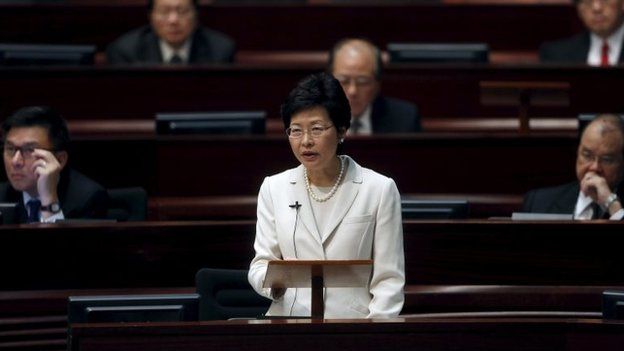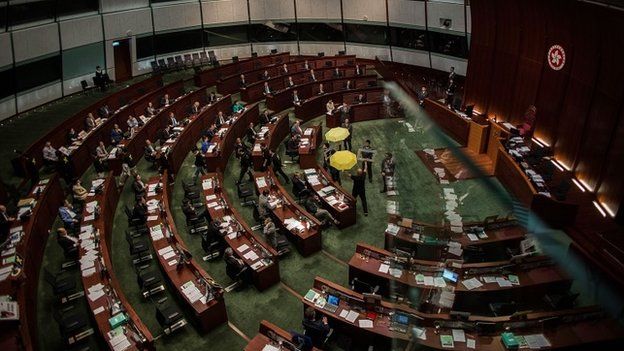Hong Kong's government has unveiled proposed reforms for the next election, which do not concede to pro-democracy demands for a fully free vote.
The electoral blueprint complies with guidelines from China's legislature that candidates for the 2017 election will be screened.
Democracy activists said this amounted to a "fake democracy".
When the guidelines were announced last August there were weeks of street protests and some violent clashes.
Carrie Lam, Hong Kong's second highest government official, put forward the reform package.
"These proposals are in strict compliance with the Basic Law [Hong Kong's constitution] and the relevant decisions of [China's] standing committee of the National People's Congress," Ms Lam said.
"At the same time they fully take into account the views expressed by various sectors of the community," she said.

Hong Kong's leader will be chosen by the general population of more than five million eligible voters in the 2017 elections for the first time.
However, the process prior to that was outlined by Ms Lam:
- A primary vote will take place where the 1,200 members of the largely pro-Beijing nominating committee will get one vote each.
- A candidate will have to win at least 120 votes which will result in a shortlist of between five and 10 candidates.
- These candidates will then be put to a second round of voting by members of the nominating committee.
- Each member will cast at least two approval votes.
- The two or three candidates who win more than 600 votes each will then be eligible to run in the public election.
Pro-democracy protesters have said this process allows Beijing to eliminate unwanted candidates and does not amount to universal suffrage.
Thousands of people barricaded parts of Hong Kong for more than two months in protest when the guidelines were first announced last year.
But China has repeatedly made it clear that no concessions will be given. In December, Hong Kong police dismantled the last of the protest camps.
'Two systems'
The electoral proposal is due to be voted on in the legislature in the summer, and needs a two-thirds majority in the 70-member Legislative Council to be passed.

The 27 pan-democratic lawmakers have mostly vowed to veto it. Many of them walked out of the chamber after the proposal was announced.
"We will launch a campaign to oppose the proposal and we will ask the Hong Kong public to continue to seek true universal suffrage," Civic Party lawmaker Alan Leong said.
The government will have to win over at least four of them to get the proposal through.
Speaking beforehand, the city's leader, Chief executive CY Leung, warned that if the proposal was vetoed this time, it would be a number of years before it was discussed again.
That would mean the current system, under which the chief executive is elected by a 1,200-member election committee, would remain in place.
China governs Hong Kong, a former British colony, under the "one country, two systems" principle.
The system has allowed the city a high degree of autonomy and civil rights, including freedom of assembly and free speech.
Hong Kong's mini-constitution says the ultimate aim is to elect the chief executive "by universal suffrage upon nomination by a broadly representative nominating committee".
No comments:
Post a Comment